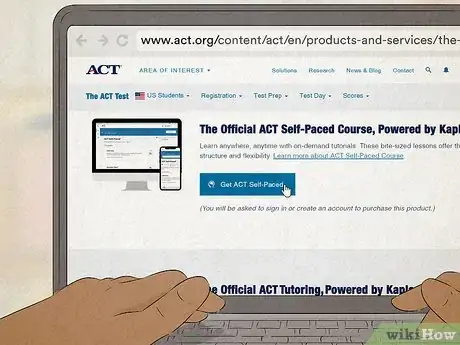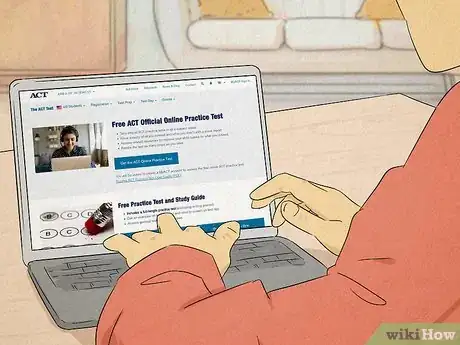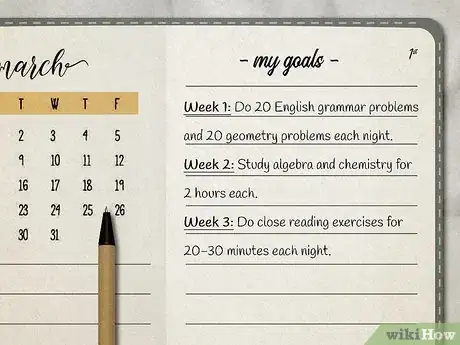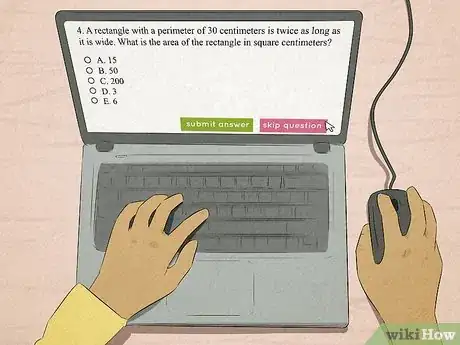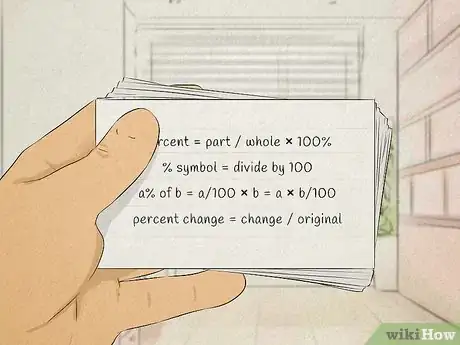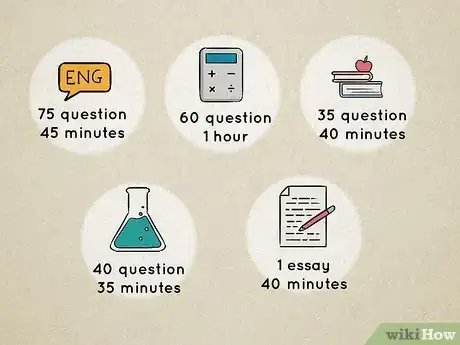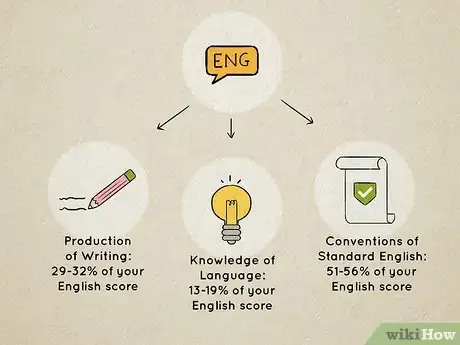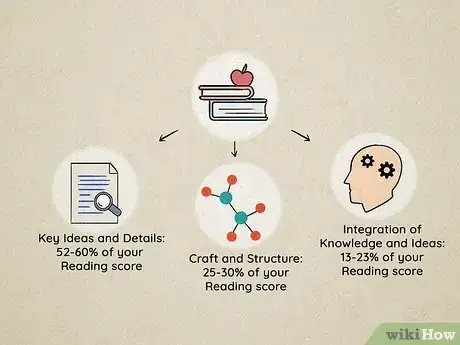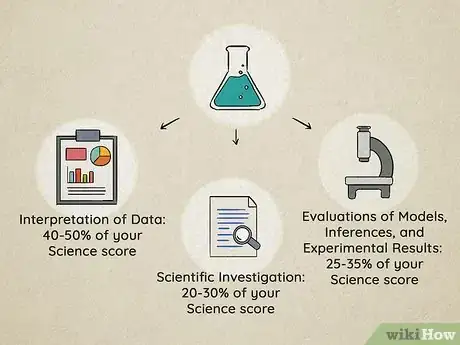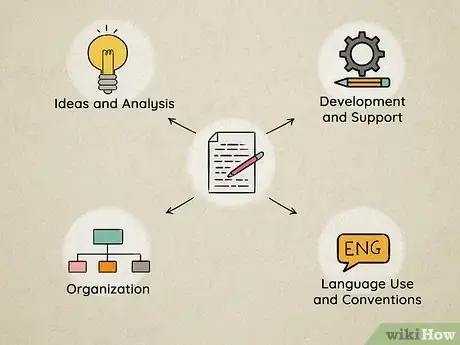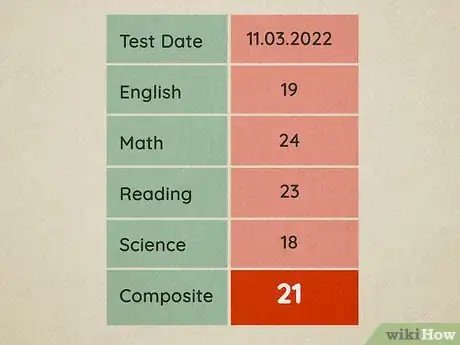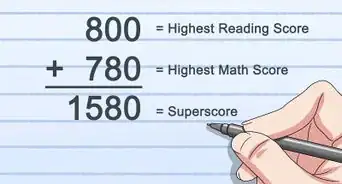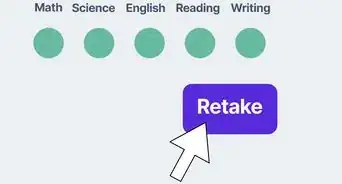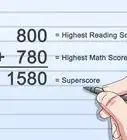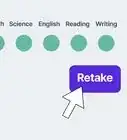This article was co-authored by Alexander Ruiz, M.Ed. and by wikiHow staff writer, Janice Tieperman. Alexander Ruiz is an Educational Consultant and the Educational Director of Link Educational Institute, a tutoring business based in Claremont, California that provides customizable educational plans, subject and test prep tutoring, and college application consulting. With over a decade and a half of experience in the education industry, Alexander coaches students to increase their self-awareness and emotional intelligence while achieving skills and the goal of achieving skills and higher education. He holds a BA in Psychology from Florida International University and an MA in Education from Georgia Southern University.
There are 23 references cited in this article, which can be found at the bottom of the page.
This article has been viewed 54,012 times.
Congrats on registering for the ACT test! This exam may seem intimidating, but it’s not nearly as scary as it looks; in fact, half of the battle is knowing what you’re up against. Not to worry–you’ve come to the right place. We’re here to walk you through plenty of test-taking resources and tips, so you can maximize your studying time. We’ve also provided plenty of nitty-gritty details about the test’s scoring system and format, so you can understand the ACT inside and out. When test day rolls around, you’ll be able to put your very best foot forward!
Steps
ACT Prep Resources
-
1Download the ACT’s free test prep guide from the official website. This guide covers all the sections of the test. It even goes over administrative details, like national test dates and ways to get your testing fee waived.[1]
- You can download it here: https://www.act.org/content/act/en/products-and-services/the-act/test-preparation.html
- You’ll need to submit your first name, email, role (student, parent, etc.), and country in order to get the download.
-
2Sign up for a free test prep class. The ACT organization offers free online test prep events along with other freebies. Any of these free resources (freesources, if you will) are available through Kaplan, a well-known test prep organization that the ACT group partners with. Through the ACT and Kaplan sites, you get access to free practice tests, free half-length tests, free pop quizzes, and even free questions of the day. Kaplan also hosts free online sample classes that are an hour long.[2]
- You can find plenty of freebies here: https://www.act.org/content/act/en/products-and-services/the-act/test-preparation/free-act-test-prep.html (Keep in mind that some links may redirect to Kaplan’s website.)
Advertisement -
3Treat the library as a free study resource. Search your school or local library catalog for “ACT,” and see what kind of titles come up. While you won’t be able to physically write or highlight in the test prep books, they’re still a great, free resource that can help move your studying along.[3]
-
4Chat with people who took the ACT before. Send a few texts out to your classmates, upperclassmen, older friends, relatives, and acquaintances—chances are, at least one of them has taken the ACT at one point or another. Ask them how they felt during the test, and what the test-taking process was like. Was the test what they expected, or were they surprised by aspects of it? Their experiences might help give you some important context and insight before your test day arrives.[4] You might say:
- “You took the ACT last semester, right? How was it? Is there anything I should watch out for?”
- “Is it hard to pace yourself during the ACT? I remember you taking it last year, so I just wanted to check-in.”
-
5Ask a teacher if they can look over and grade your practice materials. Explain that you’re preparing for the ACT, and see if they’d have time to look over some of your study materials. Don’t be too surprised or disappointed if they say no, though—teachers are super busy with grading and other obligations, and may not have time to provide extra help.[5] You might say:
- “Hey Ms. McDonald! I know that you’re probably really busy, but I was wondering if you could take a look at this sample pop quiz I took for the ACT Science test. I’d really value your input on where I could improve.”
- “Hey Mr. Davis! Do you think you could take a look at a sample ACT Math worksheet I filled out the other day? I completely understand if you don’t have time; still, if you can spare a moment, I’d really appreciate your feedback.”
-
6Sign up for tutoring with the official ACT organization. In partnership with Kaplan, the ACT group offers personalized tutoring packages where you can meet one-on-one with a tutor. These tutoring packages also include plenty of practice tests, lots of word banks, video lessons, and helpful homework assignments. Keep in mind that personalized tutoring can be pretty pricey, and costs at least $700.[6]
- Kaplan also offers a self-paced test prep course for around $100. It’s not as personalized as their other packages, but it is more budget-friendly!
ACT Study Tips
-
1Set a target ACT score goal based on the schools you’re applying to. Open up a search engine and type in the name of your dream school, along with the phrase “average ACT.” Use the search results to jot down 75th percentile scores, if you can find them—this represents the scores of students who performed better than 75% of the college’s student body. This is a great score to aim for and will put you well ahead of the average student at that school.[7]
- For example, your target ACT score for Boise State University would be 26, while your target score for the University of Maryland would be 33.
- Keep your practice test score in mind when setting a target goal. There’s nothing wrong with setting the bar high for yourself, but you also don’t want to overwhelm yourself with impossible standards.
-
2Take a practice test without studying to find your starting point. The official ACT organization offers a free practice test, which is a great way to figure out your starting point. Complete this test, and then use the provided answer key to grade yourself. Chances are, you did better in some sections than others—that’s totally fine! These weaker sections will be the focal point of your future study sessions.[8]
- You can download a free practice test here: https://www.act.org/content/dam/act/unsecured/documents/Preparing-for-the-ACT.pdf
-
3Make a study plan based on your practice test results. Dedicate more of your study time to your lower-scoring subjects. Create a study plan that revolves around these topics, so you have a better chance of boosting your score when test day arrives.[9] Obviously, don't forget to brush up your strong subjects as well, so they don't fall behind. Here’s a sample study you might follow for a few weeks:
- Week 1: Do 20 English grammar problems and 20 geometry problems each night.
- Week 2: Study algebra and chemistry for 2 hours each.
- Week 3: Do close reading exercises for 20-30 minutes each night.
-
4Give yourself at least 20 hours of study time to prep for the exam. According to a study conducted by the official ACT organization, students who study for at least 20 hours typically receive an ACT score that’s 0.7 points higher than students who only study for a short chunk of time.[10] Give yourself around 3 months to study if you’re taking the ACT for the first time. If you’re a veteran test-taker, you may only need 1-2 months to get ready.[11]
- Most students take the ACT at some point during their junior or senior year of high school. Start your test prep over summer break if you’re scheduled to take the test during the autumn semester. If you’re taking the test during the spring semester, kickstart your studying throughout the winter months.
-
5Teach difficult ACT concepts to others so you understand them better. Focus on a topic or subject that’s really tripping you up, whether it’s astronomy, algebra, English grammar, or something else entirely. After a round of studying, walk a friend or family member through a mini-lesson or problem related to that problem. Having to explain and talk through the topic will deepen your understanding of it![12]
-
6Take timed practice ACT tests so you’re ready for test day. When averaged out, you have about 36 seconds for each English question, 52 seconds for each reading question, and 60 seconds for each math problem.[13] It can be easy to lose track of time during the ACT, especially if you’re super focused on a specific problem. Setting a timer can help hone your time management skills, and help you feel better prepared.[14] Here’s a handy guide for timing your test:
-
7Practice skipping questions that you don’t understand. Keep in mind that the ACT won’t deduct points for wrong answers or skipped questions. Instead, skip over any tricky questions and go on to the next one. You can always go back and review questions once you’re done![20]
- The ACT has very strict time constraints for each section. It may feel satisfying to spend 10 minutes on a tough math question, but it’s not worth leaving a big chunk of the test unfinished.[21]
-
8Memorize simple formulas to prepare for the math section. Unfortunately, the ACT math test won’t provide any formulas for you to reference. Thankfully, memorizing them shouldn’t be too difficult after hours and hours of math class and math homework.[22] Here’s a handy reference guide made by the ACT organization that outlines all the math formulas you’ll need to know (organized by test section): https://www.act.org/content/dam/act/unsecured/documents/2020/ACT-Formula-Sheet.pdf
-
9Prepare for the writing exam with daily reading and writing exercises. Each day, take a few minutes to read articles or publications on different debates or arguments—this will help prepare you for the writing prompt. Try writing simple essays in your free time, catering each one to a different type of audience. Even school assignments, creative stories, and journal entries can help you hone your writing skills before the test.[23]
- Try setting a timer whenever you write. This way, you’ll get better at organizing and jotting down your thoughts under pressure.
- Show your work to the people closer to you — like your friends or your parents —so they can help with writing feedback. After some improvement, try working with your teachers, as they are an even more relevant source for editing. These feedbacks will surely help you obtain better results.
ACT Format and Scoring
-
1The ACT has 4 total parts and an optional writing section. Aside from the writing test, the ACT is completely multiple-choice and has 215 questions overall. The exam starts with an English test, followed by a math, reading, and science test.[24] The writing test, if you choose to register for it, comes after the first 4 subject sections.[25] Here’s a break-down of each test section:
- English: Complete 75 multiple-choice questions in a timespan of 45 minutes. In this section, you’ll answer questions related to the grammar of written passages.[26]
- Math: Answer 60 multiple-choice questions in 1 hour.[27]
- Reading: Answer 35 multiple-choice minutes in 40 minutes related to specific written passages.[28]
- Science: Complete 40 multiple-choice questions in 35 minutes related to specific passages.[29]
- Writing: Write an essay in 40 minutes that fleshes out your perspective on an issue provided in a writing prompt.[30]
-
2English: This section will test your English grammar and writing knowledge in different ways. The “Production of Writing” category covers questions about the focus, purpose, and flow of a writing passage, while the “Knowledge of Language” category includes questions about word choice, tone, writing style. The “Conventions of Standard English “ category covers questions about grammar, structure, punctuation, and mechanics. Here’s the exact score break-down for each section:[31]
- Production of Writing: 29-32% of your English score
- Knowledge of Language: 13-19% of your English score
- Conventions of Standard English: 51-56% of your English score
-
3Mathematics: This section will test your basic knowledge and application of math. The first category, “Preparing for Higher Mathematics,” covers a variety of math topics that you’ve probably already learned in school, including “Number and Quantity,” “Algebra,” “Functions,” “Geometry,” and “Statistics and Probability.” The second category, “Integrating Essential Skills,” includes questions that require you to use different math skills in unique situations. The third category, “Modeling,” has questions that revolve around models. Here’s the precise score break-down:[32]
-
Preparing for Higher Mathematics: 57-60% combined
- Number and Quantity: 7-10% of your Math score
- Algebra: 12-15% of your Math score
- Functions: 12-15% of your Math score
- Geometry: 12-15% of your Math score
- Statistics and Probability: 8-12% of your Math score
- Integrating Essential Skills: 40-43% of your Math score
- “Modeling” questions pop up in both the “Preparing for Higher Mathematics” and “Integrating Essential Skills” categories, so this category doesn’t have a specific grading break-down.
-
Preparing for Higher Mathematics: 57-60% combined
-
4Reading: This section will force you to use your close reading skills in different ways. The “Key Ideas and Details” category tests your understanding of different passages, while the “Craft and Structure” category takes a deep dive into the word choice, meaning, and purpose of a passage. The “Integration of Knowledge and Ideas” category requires you to relate different passages, synthesize claims and arguments, and identify facts apart from opinions in a text. Here’s the score break-down for this section:[33]
- Key Ideas and Details: 52-60% of your Reading score
- Craft and Structure: 25-30% of your Reading score
- Integration of Knowledge and Ideas: 13-23% of your Reading score
- Some questions in the Reading section (“Integration of Knowledge and Ideas” specifically) may include a visual aid to support the text passage, like a graph or table.
-
5Science: This section includes questions related to the natural sciences. The first category, “Interpretation of Data,” requires you to analyze data presented in specific problems. The second category, “Scientific Investigation,” asks experiment-focused questions, and the third category, “Evaluations of Models, Inferences, and Experimental Results,” focuses on analyzing and evaluating the provided scientific info. Here’s how the score breaks down:[34]
- Interpretation of Data: 40-50% of your Science score
- Scientific Investigation: 20-30% of your Science score
- Evaluations of Models, Inferences, and Experimental Results: 25-35% of your Science score
- “Natural sciences” is an umbrella term for Earth sciences, chemistry, physics, and biology. You don’t have to be AP-level in these subjects to succeed at this section, but it may help to brush up on the basics before the test.
-
6Writing: a 40-minute essay. In the optional writing portion of the ACT, you get a prompt that outlines a complicated topic with multiple perspectives. In the next 40 minutes, you write an essay explaining your perspective and comparing it to the perspectives provided in the writing prompt.[35] You’ll get an overall score for your essay, as well as separate scores in 4 different categories (all rated on a scale of 2 to 12). Here are the subcategories your Writing test will be judged on:
- Ideas and Analysis
- Development and Support
- Organization
- Language Use and Conventions[36]
-
7Your ACT (Composite) Score will be a number between 1 and 36. This test score gets calculated by ACT officials and is based on how many answers you get right on the test. The total number of correct answers gets converted to scale scores, which are averaged together to create your Composite Score.[37] The writing portion of the ACT is broken down into different grading categories along with an overall score; however, this isn’t factored into your total Composite Score.[38]
- An English score of 19, a Science score of 24, a Math score of 23, and a Reading score of 18 would give you a Composite Score of 21.
- An English score of 35, a Science score of 35, a Math score of 35, and a Reading score of 36 would give you a Composite Score of 35.
Community Q&A
-
QuestionHow do you outsmart the ACT?
 Alexander Ruiz, M.Ed.Alexander Ruiz is an Educational Consultant and the Educational Director of Link Educational Institute, a tutoring business based in Claremont, California that provides customizable educational plans, subject and test prep tutoring, and college application consulting. With over a decade and a half of experience in the education industry, Alexander coaches students to increase their self-awareness and emotional intelligence while achieving skills and the goal of achieving skills and higher education. He holds a BA in Psychology from Florida International University and an MA in Education from Georgia Southern University.
Alexander Ruiz, M.Ed.Alexander Ruiz is an Educational Consultant and the Educational Director of Link Educational Institute, a tutoring business based in Claremont, California that provides customizable educational plans, subject and test prep tutoring, and college application consulting. With over a decade and a half of experience in the education industry, Alexander coaches students to increase their self-awareness and emotional intelligence while achieving skills and the goal of achieving skills and higher education. He holds a BA in Psychology from Florida International University and an MA in Education from Georgia Southern University.
Educational Consultant Focus your study time on the subjects that you're less proficient in! Ultimately, the ACT is a standardized assessment of the knowledge that you currently hold; to get a good score, you'll want to spend a little more time on the sections you aren't as confident in. For example, a student who's really proficient in math might spend more of their study sessions focusing on the writing or science sections of the test.
Focus your study time on the subjects that you're less proficient in! Ultimately, the ACT is a standardized assessment of the knowledge that you currently hold; to get a good score, you'll want to spend a little more time on the sections you aren't as confident in. For example, a student who's really proficient in math might spend more of their study sessions focusing on the writing or science sections of the test. -
QuestionWhere do you start when preparing for the ACT?
 Arash FayzArash Fayz is the Co-Founder and Executive Director of LA Tutors 123, an academic consulting and private tutoring company based in Los Angeles, California. Arash has over 10 years of educational consulting experience, managing the tutoring of students of all ages, abilities, and backgrounds to score higher on standardized tests and gain admission to their target schools. He has a BA in Applied Mathematics and Computer Science from the University of California, Los Angeles.
Arash FayzArash Fayz is the Co-Founder and Executive Director of LA Tutors 123, an academic consulting and private tutoring company based in Los Angeles, California. Arash has over 10 years of educational consulting experience, managing the tutoring of students of all ages, abilities, and backgrounds to score higher on standardized tests and gain admission to their target schools. He has a BA in Applied Mathematics and Computer Science from the University of California, Los Angeles.
Test Prep Tutor First focus on what will be on the ACT, then on how you should take it. When you're preparing for the ACT, first, you have to understand the content that's on test itself. Once you're comfortable with that, you can focus on your test-taking strategy, like answering questions quickly and using the process of elimination to find the right answer.
First focus on what will be on the ACT, then on how you should take it. When you're preparing for the ACT, first, you have to understand the content that's on test itself. Once you're comfortable with that, you can focus on your test-taking strategy, like answering questions quickly and using the process of elimination to find the right answer. -
QuestionWhat's the best online ACT study course?
 wikiHow Staff EditorThis answer was written by one of our trained team of researchers who validated it for accuracy and comprehensiveness.
wikiHow Staff EditorThis answer was written by one of our trained team of researchers who validated it for accuracy and comprehensiveness.
Staff Answer wikiHow Staff EditorStaff AnswerCheck online reviews to get a sense of what study courses students are liking/not liking. As a starting point, you can check out Kaplan's test prep site—they're officially partnered with the ACT organization and are sure to have helpful materials.
wikiHow Staff EditorStaff AnswerCheck online reviews to get a sense of what study courses students are liking/not liking. As a starting point, you can check out Kaplan's test prep site—they're officially partnered with the ACT organization and are sure to have helpful materials.
References
- ↑ https://www.act.org/content/act/en/products-and-services/the-act/test-preparation.html
- ↑ https://www.act.org/content/act/en/products-and-services/the-act/test-preparation/free-act-test-prep.html
- ↑ https://www.usnews.com/education/best-colleges/slideshows/10-test-prep-tips-for-sat-and-act-takers?slide=9
- ↑ https://www.usnews.com/education/best-colleges/slideshows/10-test-prep-tips-for-sat-and-act-takers?slide=10
- ↑ https://www.usnews.com/education/best-colleges/slideshows/10-test-prep-tips-for-sat-and-act-takers?slide=9
- ↑ https://www.kaptest.com/act/courses/act-tutoring
- ↑ https://www.fastweb.com/college-search/articles/whats-a-good-score-on-the-act-anyway
- ↑ https://www.act.org/content/act/en/students-and-parents/college-planning-resources/testing-advice-for-the-act/tips-to-taking-the-act.html
- ↑ https://www.act.org/content/act/en/students-and-parents/college-planning-resources/testing-advice-for-the-act/tips-to-taking-the-act.html
- ↑ https://www.act.org/content/dam/act/unsecured/documents/Info-Brief-2014-7-rev1.pdf
- ↑ https://www.fastweb.com/college-search/articles/how-early-should-i-begin-act-sat-prep
- ↑ https://www.act.org/content/act/en/students-and-parents/college-planning-resources/high-school-life/develop-solid-study-skills.html
- ↑ https://collegesofdistinction.com/advice/sat-and-act-study-tips/
- ↑ https://www.usnews.com/education/best-colleges/slideshows/10-test-prep-tips-for-sat-and-act-takers?slide=12
- ↑ https://www.act.org/content/act/en/products-and-services/the-act/test-preparation/reading-practice-test-questions.html?page=0&chapter=0
- ↑ https://www.act.org/content/act/en/products-and-services/the-act/test-preparation/english-practice-test-questions.html?page=2&chapter=0
- ↑ https://www.act.org/content/act/en/products-and-services/the-act/test-preparation/math-practice-test-questions.html?page=0&chapter=0
- ↑ https://www.act.org/content/act/en/products-and-services/the-act/test-preparation/science-practice-test-questions.html?page=0&chapter=0
- ↑ https://www.act.org/content/act/en/products-and-services/the-act/test-preparation/description-of-writing-test.html
- ↑ https://collegesofdistinction.com/advice/sat-and-act-study-tips/
- ↑ https://www.act.org/content/act/en/products-and-services/the-act/test-preparation/description-of-math-test.html
- ↑ https://www.act.org/content/act/en/products-and-services/the-act/test-preparation/description-of-math-test.html
- ↑ https://www.act.org/content/dam/act/unsecured/documents/Preparing-for-the-ACT.pdf
- ↑ https://collegereadiness.collegeboard.org/sat/inside-the-test/compare-new-sat-act
- ↑ https://www.act.org/content/act/en/products-and-services/the-act/test-preparation/description-of-writing-test.html
- ↑ https://www.act.org/content/act/en/products-and-services/the-act/test-preparation/english-practice-test-questions.html?page=2&chapter=0
- ↑ https://www.act.org/content/act/en/products-and-services/the-act/test-preparation/math-practice-test-questions.html?page=0&chapter=0
- ↑ https://www.act.org/content/act/en/products-and-services/the-act/test-preparation/reading-practice-test-questions.html?page=0&chapter=0
- ↑ https://www.act.org/content/act/en/products-and-services/the-act/test-preparation/science-practice-test-questions.html?page=0&chapter=0
- ↑ https://www.act.org/content/act/en/products-and-services/the-act/test-preparation/description-of-writing-test.html
- ↑ https://www.act.org/content/dam/act/unsecured/documents/Preparing-for-the-ACT.pdf
- ↑ https://www.act.org/content/dam/act/unsecured/documents/Preparing-for-the-ACT.pdf
- ↑ https://www.act.org/content/dam/act/unsecured/documents/Preparing-for-the-ACT.pdf
- ↑ https://www.act.org/content/dam/act/unsecured/documents/Preparing-for-the-ACT.pdf
- ↑ https://www.act.org/content/dam/act/unsecured/documents/Preparing-for-the-ACT.pdf
- ↑ https://www.act.org/content/act/en/products-and-services/the-act/scores/writing-test-scores.html
- ↑ https://www.act.org/content/act/en/products-and-services/the-act/scores/understanding-your-scores.html
- ↑ https://www.act.org/content/act/en/products-and-services/the-act/scores/writing-test-scores.html
- ↑ https://www.act.org/content/act/en/students-and-parents/college-planning-resources/high-school-life/develop-solid-study-skills.html
- ↑ https://www.bbc.com/future/article/20140917-the-worst-way-to-learn
About This Article
To study for the ACT, start preparing several months in advance and set aside a little time every day to go over your materials. Try to focus on one of the test's 4 main topics—math, English, writing, and science—at a time. Once you've studied each topic thoroughly, spend some time targeting any topics that are particularly hard for you. Use materials like ACT study guides and practice test workbooks to help you prepare for the big day! For tips on staying calm and focused on the day of the test, read on!
